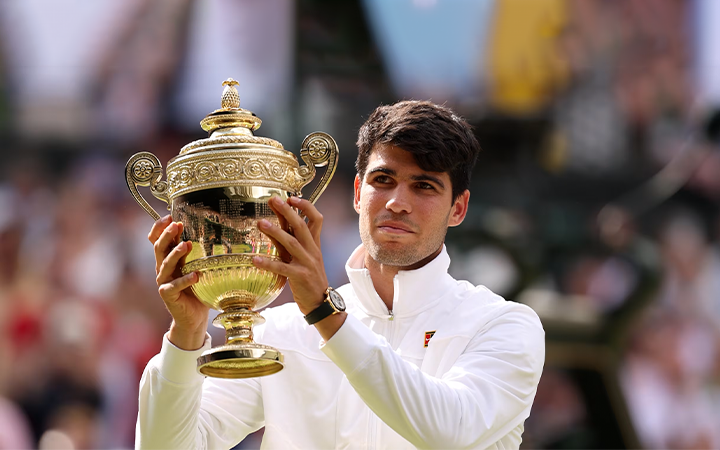It was a beatdown like none other, as Alcaraz made Djokovic look like a relic while handing him his first straight-sets final defeat at Wimbledon since the 2013 loss to Andy Murray. Nothing bolts in the same place twice. Certainly not in Novak Djokovic’s tennis career—one would believe. But it did on Centre Court on Sunday when Carlos Alcaraz played celestial tennis to vanquish the Serb 6-2, 6-2, 7-6, 4 and retain for a second straight time in the Wimbledon final.
Those ten games that Djokovic won marked a bit more than what he had against Rafael Nadal at the 2020 French Open, his worst in major finals. But it was a beatdown like no other, as Alcaraz reduced him to a relic by handing him his first straight-sets defeat in a completed match at SW19 since the 2013 final to Andy Murray.
It’s only a little more than five weeks ago that Djokovic had surgery to repair a torn meniscus, and though he bolted around the court without showing any outward signs of physical distress, he was frequently gasping for breath. But it would be unfair to point to Alcaraz’s brilliance to point to the injury, with the 21-year-old producing one of the finest matches of his life to capture his fourth Grand Slam title and the French Open-Wimbledon double revered by so many.
“I am not going to consider myself a great champion yet,” Alcaraz declared. “Not like them,” he said, nodding at Djokovic. The evidence, though, was the opposite. The only time that Djokovic’s tennis matched Alcaraz’s was in the 13-minute opening game, which had seven deuces and ended with an Alcaraz break of serve. For all of the rest, the 37-year-old 24-time Slam winner looked like a veteran novelist who lost his words.
Alcaraz held sway in that first set 6-2, shedding none of the nerves that seemed to afflict him in last year’s final and losing it 1-6. The serves were big and pinpoint; the groundstrokes were powerful and sharply angled; his favourite drop shot was there in plain sight but encrypted. But more than anything else, the forehand mesmerised—for it seemed so accurate, one could almost believe Alcaraz was controlling it with a string. The blindingly brilliant athleticism of the Spaniard, which helped him reach a raft of balls that seemed destined to be swallowed by the court, left Djokovic dumbfounded.
The early break in the second set came with even less fuss than the first, with two high-quality blocked returns from Alcaraz and a Djokovic volley gone awry. That missed volley was a recurring theme for the Serb, entirely undoing his ploy to play the net-rushing style. “He wasn’t allowing me free points on my serve,” Djokovic said. “He was reading the serve and playing with a lot of variety. And I’ve never seen him serve that way. 136 mph! I’ve never seen him serve that fast.”
He finally pounced decisively in the ninth game of the final set, when Djokovic withered. A two-footed cross-court pass whistled past him on break point without Djokovic attempting to reach it. Then Alcaraz wavered, unusually, to waste three match points from 5-4 to 40-0. On the third, he seemed a bit rattled when a fan cried out in the middle of a rally just as he was about to hit a swing volley into the open court. The ball sailed out, and in a flash, Djokovic had stretched the set to a tiebreaker.
It is not the first time that the seven-time Wimbledon champion has managed many a jailbreak in these parts, the most vivid being the 2019 final after being two match points down to Roger Federer. But Alcaraz quickly refocused and rediscovered his best tennis—a zipping forehand winner, a breathtaking pickup, and an astonishing drop shot from mid-court, highlighting the tiebreaker. A return error from Djokovic on the fourth match point sent the Spaniard into seventh heaven.
“I was inferior on the court,” Djokovic admitted. “He played every single shot better. I really don’t think I could have done much more. Try to pump myself up, maybe. Get the crowd involved. That’s what was happening in the third. That got me going a little bit. Overall, he really outplayed me.”

